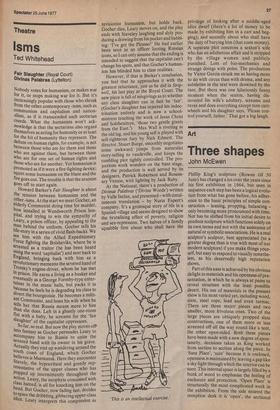Theatre
Isms
Ted Whitehead
Fair Slaughter (Royal Court) Divines Palabras (Lyttelton)
Nobody votes for humanism, or makes war for it, or stops making war for it. But it's increasingly popular with those who shrink from the other contemporary -isms, such as Communism and capitalism and nationalism, as if it transcended such sectarian Creeds. What the humanists won't acknowledge is that the sectarians also regard themselves as acting for humanity or at least for the bit of humanity they represent. The debate on human rights, for example, is not between those who are for them and those who are against them, but between those who are for one set of human rights and those who are for another. Yet humanism is Promoted as if it were a fire-fighting device; squirt some humanism on the blaze and the fire goes out. The trouble is that the arsonist goes off to start again. Howard Barker's Fair Slaughter is about the tension between humanism and the other -isms. At the start we meet Gocher o an elderly Communist doing time for murder, bow installed in Wandsworth Prison hospital, and trying to win the sympathy of Leary, a prison officer, by appealing to the tn. an behind the uniform. Gocher tells his life-story in a series of vivid flash-backs. We see him with the Allied Expeditionary Force fighting the Bolsheviks, where he is arrested as a traitor (he has been heard using the word 'capitalist') and sent back to England, bringing back with him as a revolutionary memento the severed hand of Trotsky's engine-driver, whom he has met In prison. He earns a living as a busker and eventually as a George Formby-type entertainer in the music halls, but packs it in because he feels he is degrading his class to divert the bourgeoisie. He becomes a militant Communist, and loses his wife when he tells her that Russia means more to him than she does. Left in a ghastly one-room flat with a baby, he screams for the 'fair Slaughters of the capitalist oppressors. So far, so real. But now the play moves off. Into fantasy as Gocher persuades Leary to accompany him to Russia to unite the severed hand with its owner in his grave. Actually they end up wandering around the south coast of England, which Gocher believes is Murmansk. Here they encounter Stavely, the hypocritical and greedy representative of the upper classes who has Popped up intermittently throughout the action. Leary, the neophyte consumed with class hatred, is all for knocking him on the head, But Gocher, now fading fast, decides tospare the dribbling, gibbering upper-class idiot. Leary interprets this compassion as
revisionist humanism, but holds back. Gocher dies, Leary moves on, and the play ends with Staveley laughing and slyly producing a drawing from his pocket and babbling: 'I've got the Picasso!' He had earlier been seen as an officer looting Russian icons, so I can only assume that the ending is intended to suggest that the capitalist can't change his spots, and that Gocher's humanism has blinded him to class realities.
However, if that is Barker's conclusion, you feel that he approaches it with the greatest reluctance, just as he did in Stripwell, his last play at the Royal Court. The new piece is full of misgivings as to whether any class slaughter can in fact be `fair'. (Gocher's daughter has rejected his indoctrination entirely and is now a schoolmistress teaching the work of Jesus Christ and Solzhenitsyn, 'those two gentle giants from the East.') Max Wall is riveting as the old lag, and his young self is played with self-righteous fury by Nick Edmett. The director, Stuart Burge, smoothly negotiates some awkward jumps from naturalist story-telling to vaudeville, and keeps the rambling plot tightly controlled. The projections work wonders on the bare stage, and the production is well served by its designers, Patrick Robertson and Rosemary Vercoe, with lighting by Jack Raby. At the National, there's a production of Divinas Palabras ('Divine Words') written by Valle Inclan, and presented —with simultaneous translation — by Nuria Espert's company. It's a grotesque story of life in a Spanish village and seems designed to show the brutalising effect of poverty, religion and sex-repression. Two halves of a family squabble first about who shall have the
privilege of looking after a middle-aged idiot dwarf (there's a lot of money to be made by exhibiting him in a cart and begging); and secondly about who shall have the duty of burying him (that costs money). A separate plot concerns a sexton's wife who has an adulterous affair and is stripped by the village women and publicly punished. Lots of bio-mechanics and strange doings with poles. The production by Victor Garcia struck me as having more to do with circus than with drama, and any subtleties in the text were drowned by the rant. But there was one hilariously funny moment when the sexton, having discovered his wife's adultery, screams and raves and does everything except turn cartwheels and his daughter says, 'Please control yourself, father.' That got a big laugh.














































 Previous page
Previous page